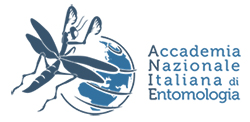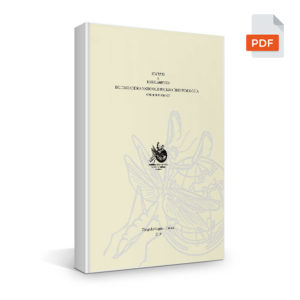Statute
CURRENT STATUTES
Art. 1. – The aim of the Italian National Academy of Entomology is to increase in every way and by every means and methodically coordinate the study of Entomology from both a purely scientific and applied point of view.
Art. 2. – The Accademia Nazionale Italiana di Entomologia is based at the Stazione di Entomologia agraria in Florence.
Art. 3. – The Italian National Academy of Entomology comprises three orders of members: the first is Ordinary, the second is Honorary, and the third is Extraordinary.
Art. 4. – The Ordinary Academicians of the Italian National Academy of Entomology must be of Italian nationality and may be chosen from the following categories of scholars:
the acting director of the Station of Agricultural Entomology in Florence;
full and extraordinary professors of pure and applied entomology at Italian universities;
Ordinary Professors of Zoology or related subjects from Italian Universities in a number not exceeding one third of the Ordinary Academicians referred to in letters (a) e b) of this Article, chosen from among those who have particularly distinguished themselves in the study of Insects and other classes of Arthropods;a tenured professor from an Italian university with particular expertise in the science of bees and mulberry bumblebees; the President of the Italian Entomological Society; other scholars who, although not holding one of the offices envisaged in the previous letters, have achieved particular fame in the study of Entomology through their works. The number of all Academicians mentioned in this paragraph d) may not exceed one-third of the Ordinary Academicians referred to in subparagraphs (a) e (b) of this Article. By way of exception and upon unanimous resolution of the assembly, two additional members may be appointed.
Honorary Academicians may normally be five in number and must be chosen from among foreign scholars who have achieved clear renown in the field of entomological disciplines.
Extraordinary Academicians may normally be five in number and must be chosen from scholars of the subject of particular competence. Extraordinary Academicians must be of Italian nationality like the Ordinaries.
Art. 5. – Ordinary Academicians have a deliberative vote, Extraordinary Academicians an advisory vote. Honorary Academicians do not have the right to vote.
Art. 6. – Ordinary and Honorary Academicians are appointed for life; Extraordinary Academicians hold office for a five-year period and may be reappointed upon expiry of that period.
Art. 7. – The Ordinary Academician who, for reasons of health or old age is no longer able to participate in the meetings of the Academy, may, by resolution of the Ordinary Academicians, be transferred to a special category of Emeriti Academicians, retaining all the honours and prerogatives of the Ordinary Academician, but leaving the seat vacant.
Art. 8. – The appointments of the Ordinary Academicians must be notified to the Minister of Education for approval by decree of the Head of State.
Professors Goidanich Athos, Professor of Agricultural Entomology at the University of Turin; Grandi Guido, Professor of Entomology at the University of Bologna; Grandori Remo, Professor of Agricultural Entomology at the University of Milan; Melis Antonio, Director of the Station of Agricultural Entomology in Florence, founders of the Italian National Academy of Entomology, shall become Ordinary Academicians at the same time as the competent State bodies approve the present Statute.
Consequently, they have the right to collectively notify the Ministry of Public Education of the names of the new Ordinary, Honorary and Extraordinary Academicians referred to in Art. 4 of this Statute to promote its approval by decree of the Head of State.
Art. 9. – The Academy has a President, a Secretary-Treasurer and a Deputy Secretary.
Art. 10. – The President of the Italian National Academy of Entomology must be chosen and elected from among the Ordinary Academicians to the letters (a) (when they have ceased to be Director of the Agricultural Entomology Station in Florence) and (b) of Art. 4 of this Statute. It holds office for three years and may be reappointed. It must be elected by the General Assembly of the Ordinary Academics by secret ballot and must obtain a number of votes equal to half plus one of the members entitled to vote in accordance with the provisions of the Rules referred to in Art. 23 of this Statute.
When the President obtains two-thirds of the votes of the eligible members and in accordance with the rules laid down in the Rules of Procedure under Art. 23 of these Statutes shall be entitled to the title of “perpetual President” and shall hold office for life in accordance with the rules laid down in the Rules of Procedure.
Art. 11. – The meeting of the Ordinary Academicians for the appointment of the President, the Vice-Secretary and, if necessary, the Secretary, is convened in the last semester of the year in which the three-year term expires. At the first convocation, the Assembly is not valid unless at least half plus one of the Ordinary Academicians participate. In second call, the Assembly is valid regardless of the number of those present.
Art. 12. – The office of Secretary-Treasurer falls to the Director of the Agricultural Entomology Station in Florence (if he is appointed as an Ordinary Academician). Otherwise, the Secretary-Treasurer is elected or re-elected by secret ballot by simple majority and holds office for three years.
Art. 13. – The Deputy Secretary has the task of assisting the Secretary-Treasurer in the performance of his duties. He is elected or re-elected by secret ballot by simple majority and holds office for three years.
Art. 14. – Convocations for the appointment of new members of the Academy shall be made once a year at a time to be determined by the Rules of Procedure referred to in Art. 23 of these Statutes. at first convocation, the meeting shall not be valid unless at least half plus one of the members entitled to vote attend. In second convocation, the meeting is valid whatever the number of those present.
Voting is by secret ballot on a written proposal signed by two Ordinary Academicians and following a report by a third member. Those with the majority of votes will be appointed.
Art. 15. – The academic year and the financial year run from 1 November to 31 October of the following year;
Art. 16. – The Academy’s assets are made up of the funds allocated by the Founding Members, contributions from governmental bodies or private individuals and any bequests and donations.
Art. 17. – The assets of the Academy must be entered in special inventories of which the Secretary-Treasurer is the custodian.
Art. 18. – Any sums derived from the alienation of property, bequests, donations or which for any reason whatsoever are to be used to increase assets, and which are not invested in real estate, must, subject to the provisions of the second paragraph of this Article, be invested in registered government securities or government-guaranteed securities.
Any other use of the aforementioned sums must be authorised in advance in accordance with the rules in force for the purchases of moral entities.
Art. 19. – The sums required for the ordinary needs of the Academy must be deposited at interest with ordinary savings banks or credit institutions designated by the President of the Academy.
Compliance with the provisions of Art. preceding and the first paragraph of this Article shall be personally liable to the President of the College.
Art. 20. – The ensemble of Ordinary and Extraordinary Academicians constitutes the Plenary Assembly of the Italian National Academy of Entomology. The entirety of the Ordinary Academicians alone constitutes the Ordinary Assembly.
The Plenary Assembly is convened at least once a year on the Academy premises. At the one convened at the beginning of the academic year, the President, or another Academician designated by the President, shall give an account of the work accomplished by the Academy during the previous year.
Readings or scientific communications may be given at the same meeting if they appear to be of exceptional importance.
Art. 21. – In addition to the purpose indicated in the previous Article or for the purpose indicated in Article 24, the President may convene plenary or ordinary meetings, at the seat of the Academy or at the seat of one of the Entomology Institutes of the Italian Universities, when he deems it appropriate in relation to the purposes of the Academy, or when at least one third of the Ordinary Academicians so request. Scholars and personalities may be invited to attend plenary or ordinary meetings; these meetings may be public.
Art. 22. – It is the responsibility of the President of the Academy to supervise and regulate the publication of writings in the Acts of the Academy.
Art. 23. – The Italian National Academy of Entomology shall, within four months of the entry into force of the present Statute, draw up its own internal regulations, which, in harmony with the Statute itself, shall lay down the rules concerning the appointment of the offices contemplated, its publications, the awarding of prizes, and anything else not contemplated in the present Statute.
These regulations will be submitted to the Ministry of Education for approval.
Art. 24. – The present statutes may not be amended unless, following a proposal signed by at least one third of the Members entitled thereto, the Ordinary Academicians, convened for this purpose, approve the proposed amendments with a number of votes in favour of not less than two thirds of the number of Academicians present at the meeting.
Furthermore, this meeting shall not be valid unless at least two thirds of the Ordinary Academicians take part in it.

